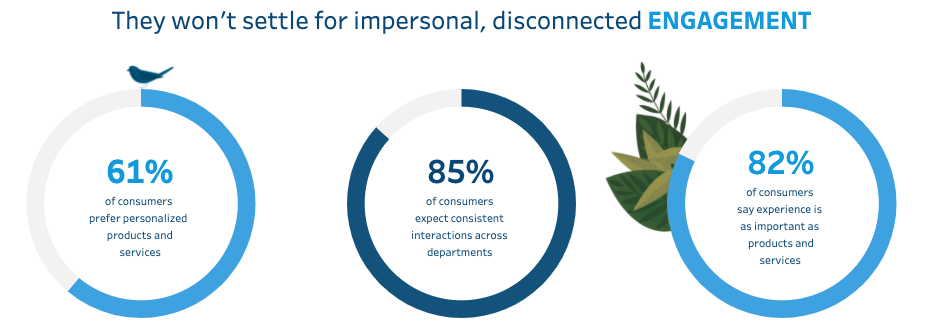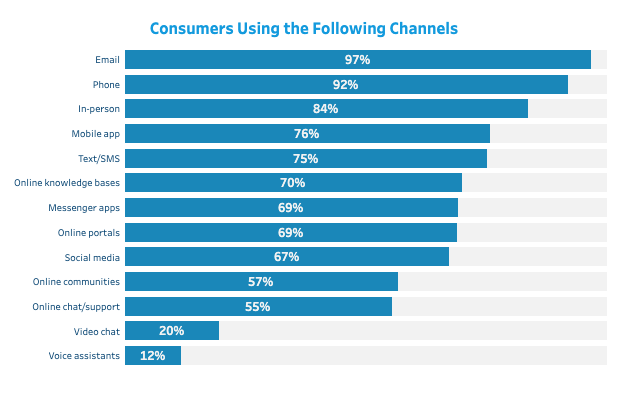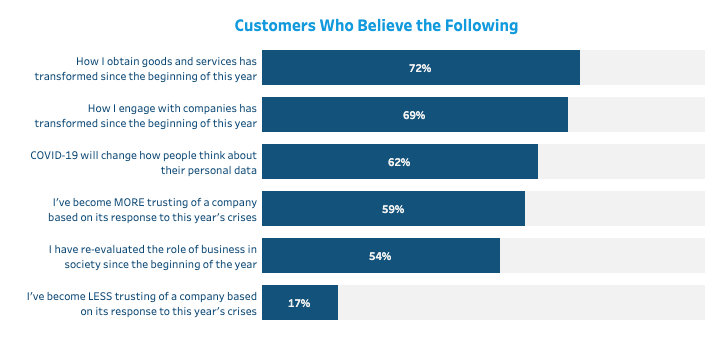The battle for customer loyalty and trust has changed dramatically in Poland. Products and services are no longer the key differentiators. And now, our research shows consumer-facing organisations across Poland are tackling new challenges.
Regardless of who you market, sell, or provide service to, your customers' expectations and behaviours have transformed with unprecedented scale and speed.
Download the State of the Connected Customer report to learn from over 15,000 global survey responses:
After the social and economic disruption experienced over the past year, customer loyalty has once again shifted. Since the start of the COVID-19 pandemic, customers are also placing more pressure than ever on businesses to adapt to their changing behaviour. So, how can you best meet their expectations?
We believe the best thing is to listen to them.
And to help you, we’ve surveyed around 500 consumers and 150 business buyers from Poland, as part of our 4th State of the Connected Customer report.
Here are some key takeaways to ease you in.
Customer experiences affect customer loyalty
There’s that word again: experiences. And especially during a crisis, it remains a key differentiator.
In Poland, 82% of consumers and 92% of business buyers now say it’s just as important as products and services.
Both sets of respondents use a varied blend of communication channels to connect and interact with businesses. And they fully expect every one of those interactions to be personalised, consistent, and empathetic. These three factors are going to drive customer loyalty for businesses in Poland.
Unfortunately, many respondents still feel like businesses are missing the mark. 85% of consumers in Poland expect consistent interactions across departments. Yet, only 46% of customers say it generally feels like sales, service, and marketing share insights.
Demonstrating empathy drives customer loyalty
There is a global trend where 68% of consumers expect brands to demonstrate empathy, but only 37% say brands generally do this.
Demonstrating empathy as a brand drives customer loyalty because customers are loyal to brands that appeal to their values and reflect the same morals. For instance, if a brand donates a portion of its profits to a noble cause, they are more likely to attract loyal customers who are also donating to the same cause.
But there’s good news too. 91% of customers who receive positive experiences say they are happy to buy from a company again, and 78% even say it’ll help them forgive past mistakes.
What channels are your customers loyal to?
In Poland, the most popular engagement channels used by consumers are:
As for business buyers, 92% often use mobile apps to contact companies, and 73% use online chatbots and support messenger services.
Data transparency boosts customer loyalty
How organisations use people’s personal data has long been the subject of contention. With high-profile data leaks and misuse still a common occurrence, it’s unsurprising that many people worry about data transparency, control, and ethical use.
Consumers are more loyal to brands and willing to share their personal data if it’s used responsibly and transparently to help fight against the pandemic. In fact, 62% of respondents in Poland say COVID-19 will change how people think about their personal data.
But if businesses are going to make use of customer data, there needs to be trust and a clear benefit for doing so. In our global study, 86% of consumers want more transparency over how their personal information is being used, and only 53% believe companies use their data for their benefit.
And with people increasingly moving to digital channels, it makes sense to use their data in a way that maps to their expectations to build trust and customer loyalty. Especially when 89% of our respondents in Poland expect companies to accelerate their digital initiatives due to COVID-19.
It’s time to improve on your customers’ terms
There’s evidence that how businesses respond to crises is having a direct impact on how much consumers and business buyers trust them.
In our report, 59% of consumers in Poland say they’ve become more trusting of a company based on its response to the previous year’s crises. And 17% have become less trusting of a company for the same reason. More broadly, 78% of customers worldwide say the past year’s crises should be a catalyst for business improvement.
We use the term crises as a catch-all, as we’re no longer just talking about the pandemic, but high-profile social and environmental changes too.
This is reflected in our study, where we learned that respondents in Poland felt there was either a major or moderate need for businesses to improve in the following ways:
Trustworthiness: 67% cite a major need, and 28% a moderate need
Environmental practices: 58% cite a major need, and 33% a moderate need
Social practices: 44% cite a major need, and 46% a moderate need
Business buyers feel similarly, with 80% of respondents in Poland telling us that vendor ethics are increasingly a factor in their purchasing decisions.
Let’s serve the connected customer
If there’s one prevailing takeaway from our report, it’s that consumer loyalty and business buyer behaviour are only going to keep on changing.
By listening, understanding, and responding to what consumers and business buyers in Poland have told us, you can help drive that change in a positive direction. But first, you need to meet their expectations as they stand right now.
With a single, centralised cloud-based CRM, you can easily unite your business around the customer. This can help you unlock the insights you need to better understand why your customers are behaving the way they are and improve your customer loyalty. In the right place, at the right time, every time.
This blog is just a snapshot of the full picture, download the fourth State of the Connected Customer report to learn more or visit Tableau to see country-specific findings for Poland.








